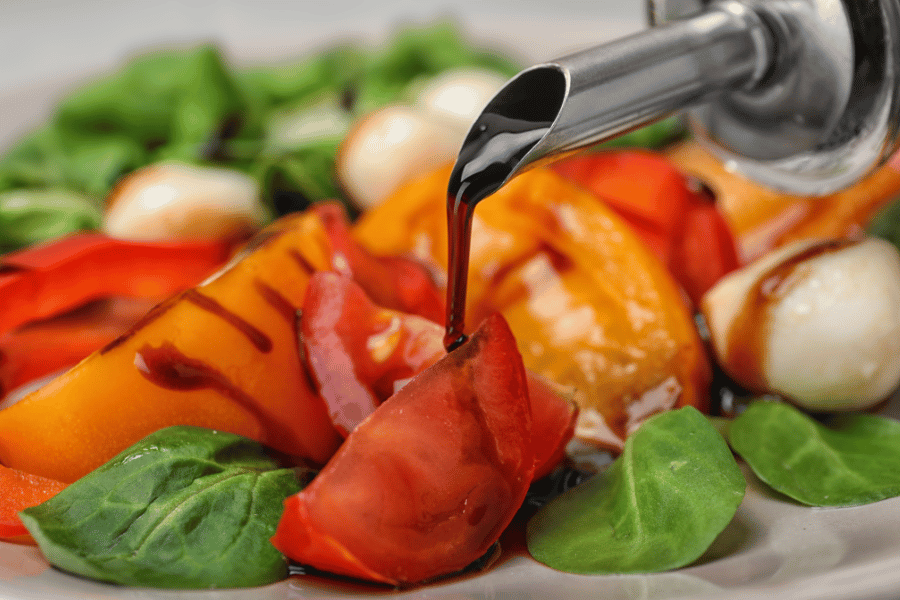Apple cider vinegar (ACV) has garnered immense popularity as a versatile ingredient in kitchens and home remedies, especially within the weight loss community. Its unique tangy flavor and purported health benefits make it a staple in many diets. However, due to dietary restrictions, personal taste preferences, or simply the need for variety, finding apple cider vinegar substitutes becomes essential for many.
In this exploration, we will delve into the top 5 healthy substitutes for apple cider vinegar that align with wellness and weight loss goals. These alternatives not only offer varied flavors and health benefits but also ensure that your culinary creations remain diverse and enjoyable. We’ll cover options ranging from the citrusy zest of lemon juice to the creamy richness of yogurt, each providing its unique twist and nutritional advantages.
Our focus will be on how these substitutes can seamlessly fit into your dietary plans, offering versatility without compromising on taste or health benefits. Whether you’re looking to add a new twist to your recipes or seeking an apple cider vinegar substitute due to health reasons, this guide will provide valuable insights and practical solutions.

apple cider vinegar substitute
Lemon Juice as a Substitute
Lemon juice emerges as a stellar apple cider vinegar substitute, particularly in the context of weight loss and health-conscious cooking. Its natural acidity and bright, citrusy flavor make it an excellent alternative, offering a similar zesty punch to dishes as apple cider vinegar.
Benefits of Using Lemon Juice as a Replacement:
- Vitamin C: Lemon juice is rich in vitamin C, an antioxidant that supports immune health and skin vitality.
- Weight Loss Aid: Similar to ACV, lemon juice can aid in weight loss efforts. It’s known for its potential to boost metabolism and promote fullness, reducing overall calorie intake.
- Digestive Health: Lemon juice can improve digestion, much like apple cider vinegar, by stimulating the digestive system and aiding in the breakdown of food.
How to Use Lemon Juice Effectively in Recipes:
- Salad Dressings: Substitute lemon juice in vinaigrettes or salad dressings to add a fresh and tangy flavor.
- Marinades: Use it in marinades for meats or vegetables to tenderize and infuse them with a refreshing citrus note.
- Detox Drinks: Lemon juice can be used in detox drinks and teas, a common practice for those on a weight loss journey, offering a palate-cleansing taste.
Citrusy Flavor and Nutritional Advantages: The sharp and invigorating taste of lemon juice makes it not just a substitute but a desirable ingredient in its own right. Its low calorie and high nutrient profile, coupled with its potential to aid in hydration and provide a burst of energy, make it an excellent choice for those looking to maintain a healthy diet.
Lemon juice stands out as a versatile and healthful apple cider vinegar substitute. Its ability to blend into various recipes while offering a host of nutritional benefits aligns perfectly with the goals of weight management and overall well-being.

apple cider vinegar substitute
Red Wine Vinegar Alternative
Red wine vinegar steps in as an elegant and flavorful apple cider vinegar substitute, especially suitable for those who appreciate a more nuanced and less acidic taste profile. This substitution is not just about mimicking the tanginess of apple cider vinegar but also about adding a unique depth and complexity to dishes.
Description of Red Wine Vinegar as a Substitute:
- Flavor Profile: Red wine vinegar offers a milder acidity compared to apple cider vinegar. It has a fruity and slightly woody flavor, derived from red wine, making it an excellent choice for a variety of culinary applications.
- Rich in Antioxidants: Like its source, red wine, this vinegar is rich in antioxidants, particularly polyphenols, which can support heart health and overall well-being.
Suitable Recipes and Dishes for Red Wine Vinegar:
- Mediterranean Dishes: Perfect for Mediterranean cuisine, red wine vinegar complements olive oil in dressings for Greek salads or marinades for grilled vegetables.
- Sauces and Reductions: It works wonderfully in sauces and reductions, adding a layer of complexity to the flavors.
- Pickling: A great pickling agent, red wine vinegar can be used to pickle vegetables, offering a gentler tang than apple cider vinegar.
Flavor Profile and Potential Health Benefits:
- Subtle Acidity: The subtle acidity of red wine vinegar makes it a great choice for those who find apple cider vinegar too sharp or overpowering.
- Digestive Health: While its impact on digestion is more gentle than apple cider vinegar, it still aids in breaking down food effectively.
- Weight Management: Its low-calorie profile and ability to enhance flavors without added sugars or unhealthy fats align well with weight loss goals.
In essence, red wine vinegar emerges as a sophisticated and healthful apple cider vinegar substitute. Its versatility in cooking, coupled with its health benefits, makes it a worthy addition to any kitchen, especially for those focused on weight management and a balanced diet.
Balsamic Vinegar as a Healthy Option
Balsamic vinegar offers a rich, complex flavor as an apple cider vinegar substitute, making it a favorite for those who seek a sweet yet tangy addition to their meals. This Italian vinegar is renowned not just for its distinct taste but also for its health benefits, particularly in the realm of weight loss and wellness.
Discussing the Rich and Complex Flavor of Balsamic Vinegar:
- Taste Profile: Balsamic vinegar boasts a unique combination of sweet and sour flavors, derived from its aging process in wooden barrels. This process imparts a depth of flavor that is both intense and subtly sweet.
- Culinary Versatility: Its rich flavor profile makes it ideal for a variety of dishes, from simple salads to more elaborate sauces and glazes.
Creative Ways to Incorporate Balsamic Vinegar into Your Meals:
- Salad Dressings: A drizzle of balsamic vinegar can transform a basic salad into a gourmet experience.
- Glazes and Reductions: Reduced balsamic vinegar creates a luscious glaze perfect for drizzling over grilled vegetables, meats, and even fruits like strawberries.
- Dips and Marinades: Balsamic vinegar can be used as a base for dips and marinades, adding a burst of flavor to your dishes.
Nutritional Advantages and Antioxidants Present:
- Rich in Antioxidants: Balsamic vinegar contains antioxidants, which combat free radicals and support overall health.
- Low in Calories: Despite its sweet taste, balsamic vinegar is low in calories, making it a weight-loss-friendly condiment.
- Aids in Digestion: Like other vinegars, balsamic can stimulate the digestive system, aiding in efficient digestion.
Balsamic vinegar stands out as a flavorful and health-beneficial apple cider vinegar substitute. Its unique taste, versatility in the kitchen, and alignment with health and weight loss goals make it an excellent choice for those looking to diversify their culinary repertoire while maintaining a focus on wellness.

apple cider vinegar substitute
White Vinegar: A Versatile Substitute
White vinegar, a pantry staple in many households, serves as a versatile and neutral apple cider vinegar substitute. While it lacks the distinctive flavors of other substitutes, its adaptability and compatibility with various dishes make it a practical choice, especially for those who prefer a milder taste.
Exploring the Neutral Taste of White Vinegar:
- Taste Profile: White vinegar has a clean, sharp, and acidic flavor with minimal sweetness or complexity. Its mild taste makes it an unobtrusive addition to recipes.
- Versatility: White vinegar’s neutral profile allows it to blend seamlessly into a wide range of dishes without overpowering the existing flavors.
How to Use White Vinegar for Various Cooking Purposes:
- Pickling: White vinegar is a popular choice for pickling vegetables and fruits, preserving them while adding a tangy note.
- Cleaning and Disinfecting: Beyond culinary use, white vinegar is employed for cleaning, disinfecting, and removing odors in households.
- Baking: In baking, it can be used as a leavening agent when combined with baking soda.
Health Considerations When Using White Vinegar:
- Low Calorie: Like other vinegars, white vinegar is low in calories, making it suitable for those aiming to reduce calorie intake.
- Digestive Aid: It can aid digestion by promoting the breakdown of food in the stomach.
While white vinegar may lack the distinctive flavors of other substitutes, its versatility, cost-effectiveness, and compatibility with various cooking applications make it a practical choice for those seeking a subtle and effective apple cider vinegar substitute. Whether you’re pickling, cleaning, or simply looking to reduce the acidity in a dish, white vinegar can be a reliable go-to option.
Frequently Asked Questions (FAQ)
In this section, we address some common questions and concerns that readers may have regarding apple cider vinegar substitutes and their applications in cooking and health-conscious living. These FAQs aim to provide clarity and guidance, ensuring that readers can confidently navigate the world of substitutions and make informed choices.
Q1: Are these substitutes suitable for all recipes?
- A: While these substitutes can work in many recipes, their suitability depends on the specific dish and the flavors you desire. Experimentation is encouraged to find the best match for each recipe.
Q2: Will using substitutes alter the health benefits of my dishes?
- A: The health benefits may vary depending on the substitute used. For example, lemon juice and red wine vinegar offer unique advantages, while yogurt provides probiotics. Choose substitutes that align with your health goals.
Q3: Can I use these substitutes in equal amounts as apple cider vinegar in recipes?
- A: The substitution ratio may differ based on the substitute. It’s advisable to start with a conservative amount and adjust to taste, as some substitutes may have stronger or milder flavors.
Q4: Are there any specific health considerations when using these substitutes?
- A: Each substitute has its own health considerations. For instance, yogurt may not be suitable for those with dairy allergies. Be mindful of dietary restrictions and preferences.
Q5: How can I incorporate these substitutes into my weight loss journey?
- A: These substitutes can be part of a balanced diet for weight management. Focus on overall calorie intake, portion control, and the nutritional benefits of your chosen substitute.
Q6: Are there other unconventional substitutes I can explore?
- A: Absolutely! The world of cooking is vast, and creative substitutions can lead to exciting culinary discoveries. Don’t hesitate to experiment with other ingredients based on your preferences and dietary requirements.